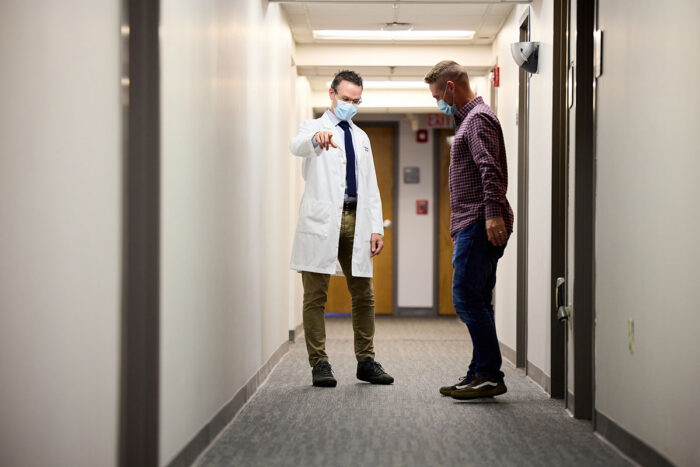
Neurologist Eric McDade, DO, meets with Marty Reiswig, a participant in Alzheimer’s prevention trials at Washington University School of Medicine in St. Louis. Reiswig comes from a family with a genetic mutation that puts carriers at high risk of developing Alzheimer’s. McDade is the director of a new Alzheimer’s prevention trial involving young adults from high-risk families. The trial is evaluating whether an investigational drug can clear a key Alzheimer’s protein called amyloid beta, and slow or stop the disease.
Washington University School of Medicine in St. Louis is launching an international clinical trial aimed at preventing Alzheimer’s disease in people genetically destined to develop the illness at a young age. Unlike most other Alzheimer’s prevention trials, this one will enroll people before the disease has taken hold – up to 25 years before the expected onset of dementia.
Called the Primary Prevention Trial, the new study will investigate whether gantenerumab — an investigational antibody under development for Alzheimer’s disease by Roche and Genentech, a member of the Roche Group — can clear a key Alzheimer’s protein called amyloid beta, and slow or stop the disease. Amyloid is the chief component of plaques that dot the brains of people with the disease. Many scientists suspect the disease originates from the buildup of amyloid plaques in the brain that start to develop up to two decades before symptoms of dementia begin.
“Overwhelming evidence suggests that the most effective way to slow or stop amyloid beta is to prevent it from building up in the first place, but most of the drugs targeted to this protein have been tested in people who already have at least some early signs of the disease, such as memory loss – when the disease is far enough along that reducing amyloid alone isn’t likely to stop it,” said Eric McDade, DO, an associate professor of neurology and the trial’s principal investigator. “We’ll be recruiting participants as young as 18. In many ways, this trial will be a necessary test of the amyloid hypothesis, which has had a major influence on Alzheimer’s research and drug development over the past 30 years.”
The new trial involves families with rare genetic mutations that cause Alzheimer’s at a young age – typically in a person’s 50s, 40s or even 30s. A parent with such a mutation has a 50% chance of passing the genetic mutation to a child, and any child who inherits the mutation is all but guaranteed to develop symptoms of dementia near the same age as his or her parent. This certainty gives researchers an opportunity to evaluate the effectiveness of drugs designed to prevent Alzheimer’s.
“It’s exciting to think of the valuable insights this groundbreaking trial will provide in the prevention of Alzheimer’s dementia,” said Fred Miller, GHR Foundation’s chief operating officer and Alzheimer’s program lead. “We’re pleased to partner boldly on the multiple DIAN-TU trials, all made possible by the strong collaboration between academic researchers, government, industry, philanthropy and the DIAN families themselves.”
Read more.

 RSS Feed
RSS Feed
